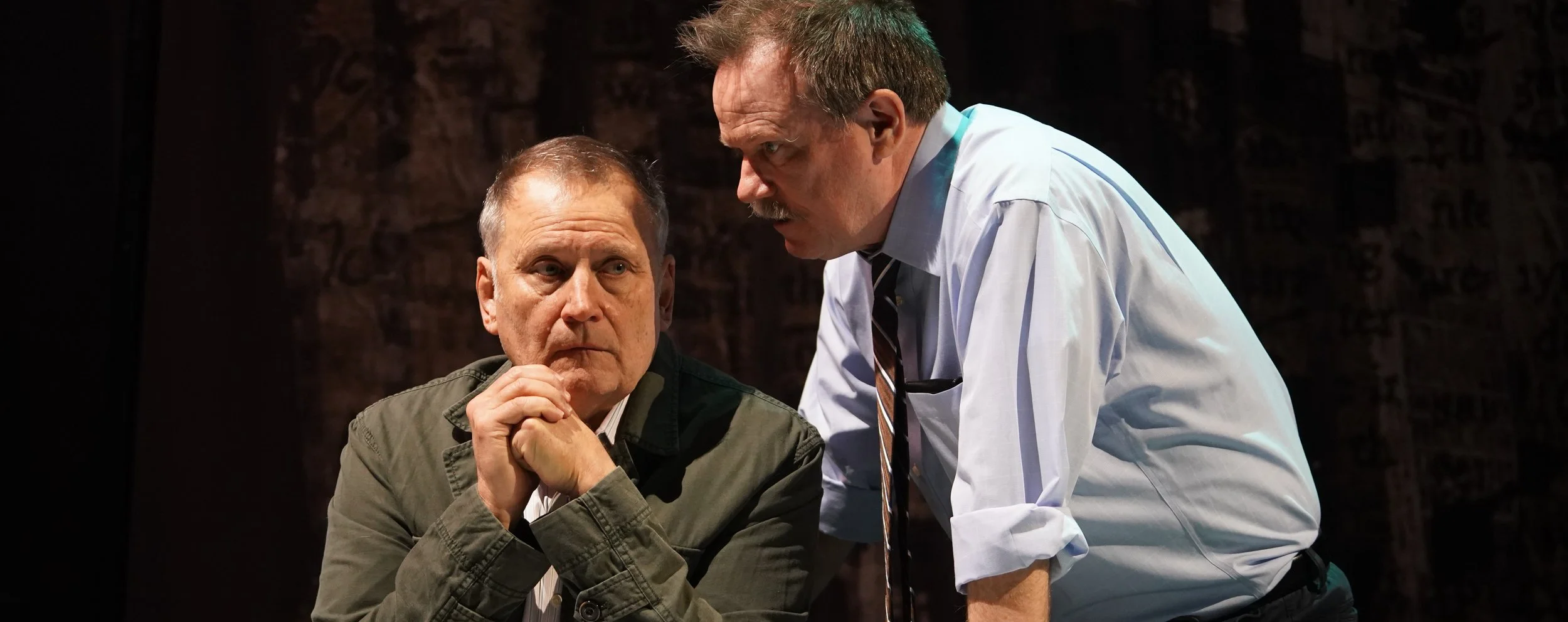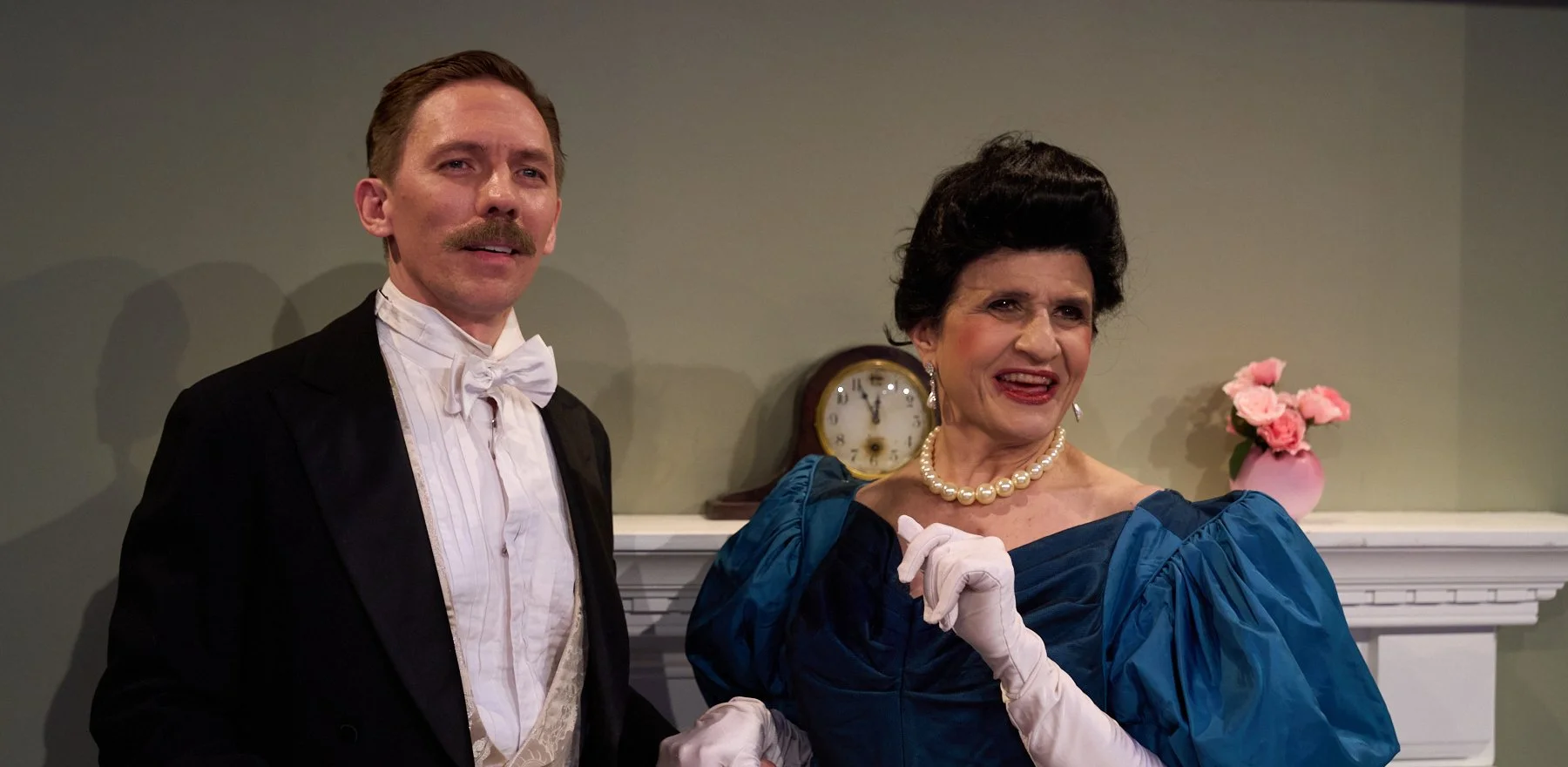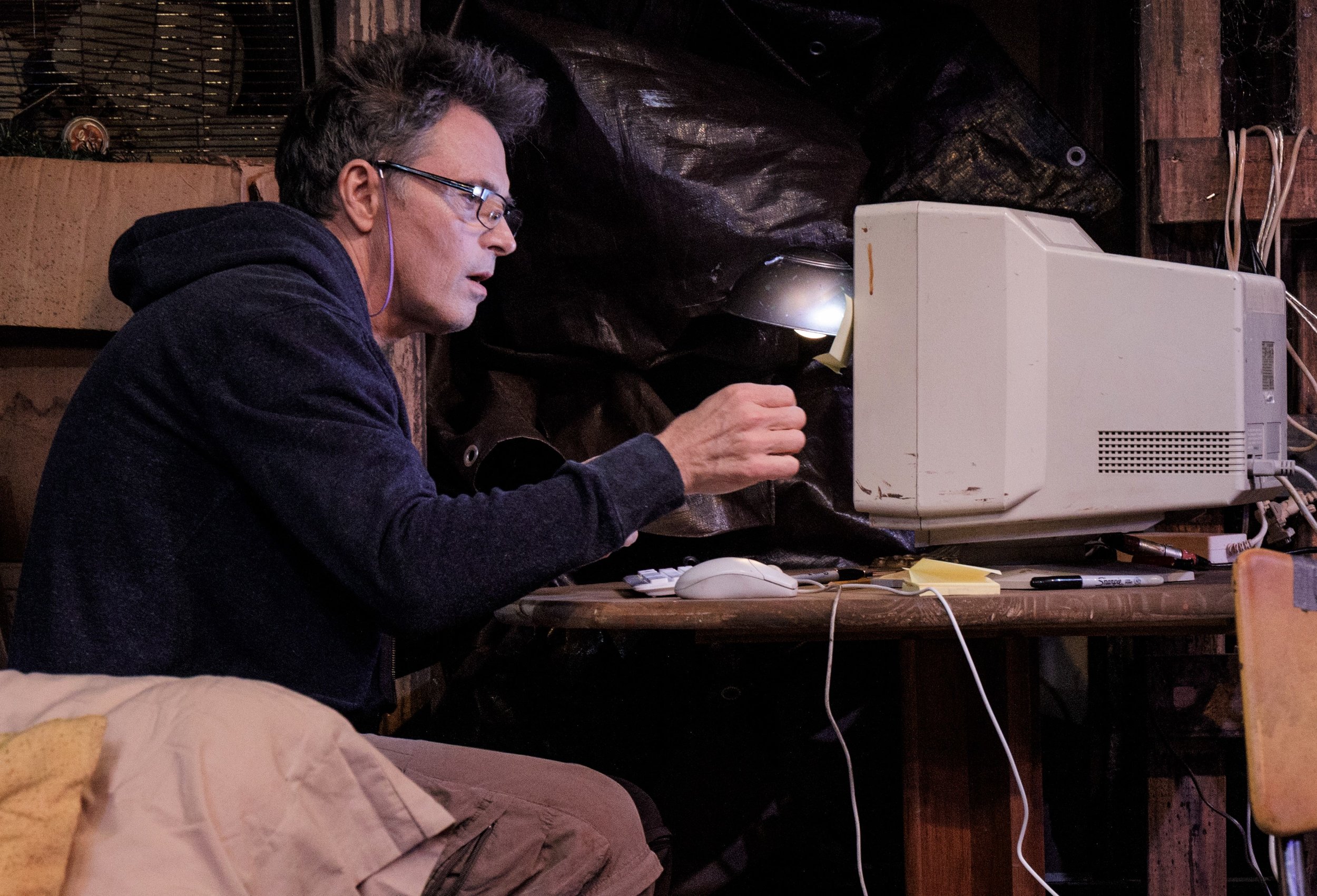Titles, even subtitles, sway playgoers’ expectations. Take, for instance, a recent press performance of Laowang: A Chinatown King Lear. Alex Lin’s new farcical melodrama zips relentlessly around jocose hairpin turns. The dialogue, stylishly delivered by a first-rate cast, is witty, urbane, and frequently arch. Yet the audience—presumably anticipating King Lear or something akin to that monumental tragedy—sat in suspended, churchlike repose throughout the play’s early scenes.
Amerikin
For all the theater community’s opposition to Donald Trump, there have been relatively few stage works taking on Trumpism. Amerikin, by Chisa Hutchinson, looks like it could be one during its first half, with its portrayal of “just your white supremacists next door,” but the story heads in a different direction when new characters and themes are introduced in Act II. Though her first act is definitely stronger, Hutchinson overall has crafted an absorbing look at life in these United States.
The Light and the Dark
Artemisia Gentileschi, the real-life subject of Kate Hamill’s uneven new drama The Light and the Dark, survived rape and a harrowing experience at her assailant’s trial to become the most accomplished female painter of the Renaissance. While Hamill’s approach to telling Gentileschi’s life story is ill-conceived in places, the playwright understands its power as a triumph over patriarchy.
Ibsen’s Ghost
Charles Busch has frequently used old films as fodder for his comedies: Red Scare on Sunset, Shanghai Moon, and The Lady in Question all draw on silver-screen melodrama for a knowing send-up of Hollywood tropes. But his latest play, Ibsen’s Ghost, is a marked change. Busch has steeped himself in the life of Norwegian playwright Henrik Ibsen and fashioned both facts and fiction into a charming and funny Improbable Biographical Fantasy, as he calls it.
Dig
The plant-store setting of Theresa Rebeck’s play Dig might be reminiscent of Little Shop of Horrors, but in Dig the plants are the victims, not the aggressors—victims of human selfishness, anger, and desire. For Roger (Jeffrey Bean), the tightly wound owner of the store (which is named Dig), the damage done to plants is more keenly felt than the damage human beings do to others or to themselves; and it is also more easily addressed, as Roger is a master of restoring vitality and life to seemingly doomed plants. With people, he’d really rather not be bothered.
Peerless
This young Off-Broadway season has already seen two new plays riffing on Macbeth, both written and directed by women and both having to do with college. Sophie McIntosh’s Macbitches, which wrapped its run at the Chain Theatre a month ago, was set in a university theater department that’s shaken up when a freshman wins the role of Lady Macbeth instead of the star senior. And now Primary Stages has debuted Peerless, Jiehae Park’s fast-talking dark comedy about Asian American siblings hell-bent on getting into the most prestigious university.
New Golden Age
Time and again, stories about what the future holds for technology and humanity have enthralled audiences—think of the rabid followings for The Twilight Zone and Black Mirror, produced 50 years apart. Playwright Karen Hartman puts forth her contribution to the genre with New Golden Age. But whereas those TV shows grabbed viewers with suspense, plot twists and amusing allegory, New Golden Age mainly offers talking. More than three-quarters of its run time is occupied by one long scene, and it consists mostly of people standing around talking. That tedium outweighs any emotional reaction that Hartman’s Facebook-run-amok scenario may elicit.
The Confession of Lily Dare
It’s been quite a while since Charles Busch, the playwright and performer who specializes in sending up old movie tropes in works like The Divine Sister and Red Scare on Sunset, has had a show that he deemed ready for review, so The Confession of Lily Dare counts as a successful return to form. It’s a loopy satire of film melodramas about fallen women, although its most prominent forbear is Shaw’s Mrs. Warren’s Profession (first performed in 1902). Few performers can discern Hollywood camp as well as Busch: he has even provided commentary on DVD releases of The Bad Seed and Dead Ringer.
Downstairs
As the novelist Joseph Heller observed, “Just because you’re paranoid doesn’t mean they aren’t after you.” And as the three characters who barely survive Theresa Rebeck’s twisting and twisted thriller, Downstairs, demonstrate, paranoia is merely one indication that someone you know could be harboring bad intentions. Other warning signs include psychopathic tendencies, the inability to separate reality and fantasy, and sheer, anesthetizing dread. Maybe your workmates are dispensing poison, or your husband is not the man you thought you knew, or your sister has had enough. Maybe that pipe wrench would be an effective blunt instrument. Or, maybe it’s just all in your head. Rebeck and her stellar cast keep us guessing through a tense, intermission-less hour and 45 minutes, while simultaneously pondering larger questions involving inheritances of both the genetic and financial variety.
John Procaccino plays Gerry, the controlling husband of Irene in Theresa Rebeck’s Downstairs. Top: Real siblings Tyne Daly and Tim Daly are Irene and Teddy, the sister and brother in Rebeck’s thrilling family drama.
Basements are notoriously the dark room where the bodies are buried, but Rebeck flips the script from the start. With a comfy couch, a coffee-making machine, and a ray of light coming in from a street level window, the downstairs is the only secure space to be had in the house of Irene and Gerry (Tyne Daly and John Procaccino). Finding safety there is Irene’s brother, Teddy (Tyne’s real-life brother, Tim Daly). He is in lost-boy mode, a grown adult wandering the room in his underpants with a glazed expression on his face. He’s had a tough time of late, but just how reliable are his tales of woe and plans for redemption? Given his stinginess with details and his shaky grasp of reality, chances are he is just plain desperate.
None of this is lost on Irene, who genuinely cares about her sibling, fortifying him with this sanctuary as well as with hot meals and desserts from their youth. Their interactions reveal an ominous family history involving an absent father and a cruel, alcoholic mother who left Irene a cash windfall and bequeathed Teddy nothing other than an unstable mind.
Irene, meanwhile, has her own dilemma. Her husband has, over the years, broken her to the point where she has become a hostage in her own home. Her talks with Teddy reveal that Gerry has taken over the finances, denied her the chance to have children and generally terrorized her into submission. The audience first encounters him at the same time Teddy does. With Irene out shopping (at least, we hope she is out shopping and not, perhaps, stuffed in an upstairs closet), the man of the house comes down to give Teddy his marching orders. He is a big guy with a creepy calmness who cannot quite sell the story that it is Irene who really wants him gone. The second time we encounter Gerry, Teddy has indeed made a departure but not before leaving Irene with information she can use to free herself from her living hell. In a wonderfully dark resolution between husband and wife, Gerry goes full psycho, uttering menacing lines like, “You found rat poison in the basement? Maybe I was killing rats.” Irene, though, holds the upper hand, and it is clenching that pipe wrench.
“Warning signs include psychopathic tendencies, the inability to separate reality and fantasy, and sheer, anesthetizing dread.”
Despite such theatrics, Rebeck avoids melodrama and endows her work with patches of poetry. For instance, reflecting on the mechanics of human nature, Irene observes, “There’s that funny thing they say, that all your cells die every seven years. ... You’re a new person, every seven years. So since then, since we were kids, we’ve been new people how many times?” Director Adrienne Campbell-Holt knows when to be subtle and when to be harsh, exploiting the seeds of doubt that, despite what the audience knows to be true, never quite go away. Is Gerry really a madman, or a reasonable fellow with an unstable wife? How is Teddy sure of his sister’s predicament while barely understanding his own? Is Irene a victim of abuse, or does insanity run deep in the family? Late in the play, Teddy is passed out on the couch, and the odds are fifty-fifty that he is either in a happy slumber, or stone-cold dead.
Teddy (Daly) makes an unsavory discovery. Photographs by James Leynse.
Mr. Daly skillfully walks the line between victim and savior. Ms. Daly, returning to the Cherry Lane, where her theater career began in 1966, pulls off the admirable feat of bringing depth to a character who has been beaten numb. And Procaccino is bone-chilling, chewing the scenery when called for, demonic when up against the wall. Among the many clever touches in the scenic design by Narelle Sissons, the smartest is the landing near the top of the staircase that leads from the unseen upstairs down to the basement. It serves as a beacon. When we spy Gerry, visible from the waist down, pausing there, the tension mounts. When a pair of female legs come into view, there is a palpable sigh of relief that Irene is still on her feet.
Theresa Rebeck’s Downstairs runs through Dec. 22 at the Cherry Lane Theatre (38 Commerce St.) on a schedule as twisted as its plot. Evening performances are at 8 p.m. Tuesday through Saturday, with an additional performance at 8 p.m. Dec. 2 but none on Dec. 20. Matinees are at 2 p.m. Wednesday and Saturday and 3 p.m. Sunday but there are no matinees on Nov. 28 or 30, or on Dec. 12. For ticket and information, call (212) 352-3101 or visit primarystages.org.
Final Follies
If you thought you knew A.R. Gurney, you’re in for a bit of a surprise. Final Follies, Primary Stages’ collection of three Gurney one-acts, reveals facets of the late, beloved playwright that steer clear of the collective impression of him. Yes, WASPs frequent the stage, though not exclusively, and Gurney is concerned as usual with questions of status, repression, and traditions passed on from generation to generation. But he wanders into what seems very un-Gurney territory—with uneven but often beguiling results.
Pride and Prejudice
Don’t underestimate Jane Austen. Her authorial voice, distinctively witty and humane, rings out above the Gothic din of early 19th-century fiction. Two centuries after her death, this middle-class provincial’s novels still enchant readers with their verisimilitude and authenticity, despite how radically manners and morals have changed.
Daniel’s Husband
Daniel’s Husband is one of those plays where, halfway through, something so unexpected, plot-altering, and tone-shifting happens that it just can’t be revealed. Michael McKeever’s comedy-drama about the still-new era of gay marriage is cleft in two—part one: comedy, part two: drama—and both halves are effective, if you’re willing to accept some questionable behavior on the part of the title character.




















